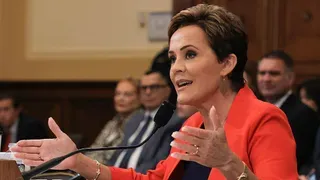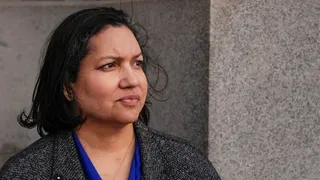October 27, 2010
Report: Lack of funding hampers response to LGBT domestic violence
Peter Cassels READ TIME: 4 MIN.
As reported incidents of LGBT domestic and intimate partner violence continue to rise, a new report concludes there's a corresponding lack of adequate funding to address the problem.
The National Coalition of Anti-Violence Programs' annual report, which the organization released on Tuesday, Oct. 26, said reported incidents of domestic and intimate partner violence in 2009 increased 15 percent from 2008. The coalition documented six murders in 2009, a 50 percent rise since 2007. The NCAVP also documented six more murders so far this year.
There's been an increase in reports of calls to police, as well as a rise in incidents involving police misconduct, according to the NCAVP.
The economy is exacerbating the crisis, the coalition reported. LGBT domestic violence is a pervasive problem at a time when organizations addressing it are closing or losing staff.
Forty-one organizations in 23 states are coalition members. Their mission is monitoring, responding to and working to end violence within the community. Examples include hate crimes, violence in relationships, rape and other forms of sexual violence and incidents involving HIV/AIDS.
The report includes data from 15 NCAVP-affiliated groups from across the country. One agency head EDGE interviewed doesn't necessarily believe LGBT domestic violence has increased-the community is now more aware of it.
"I think we've been doing much more outreach and more people know about domestic violence," said Beth Leventhal, executive director of Boston's the Network/LaRed. Increased LGBT news media coverage also has helped, she added.
"It's becoming more understood by more people," stressed Leventhal. "There's an increase in reporting and awareness that partner abuse is a problem for us as well as the straight community."
She discussed how the recession has affected the Network/La Red.
"We have not lost any staff because we do a lot of creative fundraising and juggling of funds," explained Leventhal. "We have a long history of doing a lot of work on very little money."
Her organization lost almost $60,000 in aid from the commonwealth of Massachusetts this year. "That's a significant amount of money for an agency with a small budget-about $400,000-so we are turning to the community for support to the extent that people can dig into their own pockets," said Leventhal. "It's not an easy time."
The NCAVP report provided details on known or suspected LGBT domestic violence victims in 2009.
Jeanette Martinez's ex-boyfriend allegedly shot her twice in the head in broad daylight on a Brooklyn, N.Y., street on Feb. 25, 2009, because he was reportedly upset she had left him for another woman. Martinez, 23, and a mother of a 5-year-old son, was pronounced dead at the scene.
Martinez's ex-boyfriend reportedly chased her 19-year-old girlfriend, Keila Ocasio, into the street, where a car struck her. The ex-boyfriend allegedly shot Ocasio four times, but she survived. Martinez had filed a criminal complaint against her ex-boyfriend, who remains at-large, just hours before he allegedly killed her.
Terry Williams allegedly stabbed Shawn Henderson, 28, to death in his Dallas apartment on Oct. 24, 2009. And on the same day, Ernesto Ivan Martinez, 20, allegedly stabbed Barry Horn, 59, at least 77 times inside his Brownsville, Texas, apartment.
A co-worker at the Brownsville Museum of Fine Art, where Horn was executive director, found his body. Martinez reportedly told police he murdered his former partner because he had "raped" him. Jury selection for Martinez's trial is scheduled to begin in January.
Yolanda Walker, 38, of Kansas City, Mo., was found shot to death inside her minivan on Nov. 9, 2009. Police later arrested Walker's live-in partner, Blanche Johnson, 38, and charged her with murder.
According to court documents, the police had responded to a domestic disturbance at the couple's home several hours before Johnson allegedly shot Walker, but officers declined to take either woman into custody.
The two women reportedly had an argument later in the evening about Walker wanting to end the relationship. Johnson reportedly told Walker she "had something for her," pulled out a handgun and shot her twice in the chest. A jury convicted Johnson of second-degree murder and criminal action in August. And she received a 25-year prison sentence.
Leti Martinez, 20, of San Jose, Calif., was killed in a violent dispute allegedly involving a vehicle driven by her ex-girlfriend, Jennifer Bautista, on Dec. 28, 2009. Prosecutors charged Bautista with vehicular manslaughter with gross negligence and hit-and-run, but not the murder charge Martinez's family reportedly believed she deserved.
The NCAVP did not include the name and location of the sixth victim because details have not made public and the coalition is withholding details because of privacy concerns.
EDGE has reported on several additional deadly incidents of LGBT domestic violence in Massachusetts this year.
A Boston jury convicted Nicole Chuminski in February of setting a fire that killed her girlfriend's two young daughters in 2008.
Annamarie Rintala of Granby was found strangled in her basement in March. Police suspect her wife may be involved because of a 2008 domestic assault and battery report, but thus far have not made an arrest.
Eunice Field of Brockton allegedly confessed to killing her ex-girlfriend's Alcoholics Anonymous sponsor in August because the woman had come between the couple.
Leventhal emphasized to EDGE people should not associate domestic violence only with homicide or physical abuse. "There are plenty of ways to control or abuse someone that don't involve physical violence or threats of death," she said.
Peter Cassels is a recipient of the National Lesbian and Gay Journalists Association's Excellence in Journalism award. His e-mail address is [email protected].





